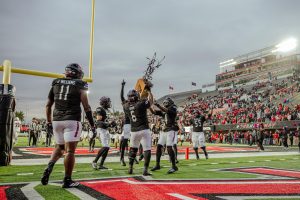Residents gather to protest war
November 12, 1990
The U.S. Congress should reconvene to debate the Persian Gulf situation rather than letting President Bush decide to go to war.
That was the call from about 100 people gathered at Saturday’s 1960s-style anti-war rally at Huntley Park, located between Second and Third streets.
“Congress should come back to Washington and stop our imperial president from involving us in war,” said Cecile Meyer, DeKalb coordinator of the Interfaith Network for Peace and Justice.
Meyer said her group focused previously on the United State’s low-intensity involvement in Central America, but they are expanding to include the Persian Gulf because of its high intensity.
People opposed to a war should know they have a group they can join, she said.
“This is like a bad dream,” said Gerald Goldin, a mathematics professor from Rutgers University in New Jersey who is visiting NIU. “Twenty-five years ago, I was at Princeton and I saw the same struggle to find out what was going on.”
During the first years when the anti-Vietnam rallying started, there was only a small minority who protested, Goldin said. It was only after people started dying that the masses got involved, he said.
“I hope we can protest before instead of after the killing starts this time,” he said.
Speakers at the rally were allowed five minutes to give their opinions on the situation. The diverse audience included NIU students and DeKalb residents of various ages, some of whom were carrying signs with sayings such as “No blood for oil.”
Not everyone was in complete agreement with the protesters, however.
“My son is over there and I don’t want a war,” said Sue McLane, a DeKalb resident for 20 years. “But I support the guys and if it means I support Bush, then I support Bush,” McLane said.
“I don’t want to see our guys treated like the soldiers from Vietnam were. They need us,” she added.
In addition to McLane, NIU senior political science and history major Mike Murvihill said conflict might be needed for resolution.
“Saddam Hussein is an aggressor who has spurned the United Nations,” Murvihill said. “It is my belief that it is our responsibility to defend Kuwait.”
Sometimes the United States has to be the police and prosecute war to keep peace, he said.
The Interfaith Network encouraged audience members who agreed with them to sign a pledge of resistance against the war as an act of nonviolent civil disobedience. Members of the Wesley Foundation, United Campus Ministries and Marxist-Humanist forum also spoke at the rally.






